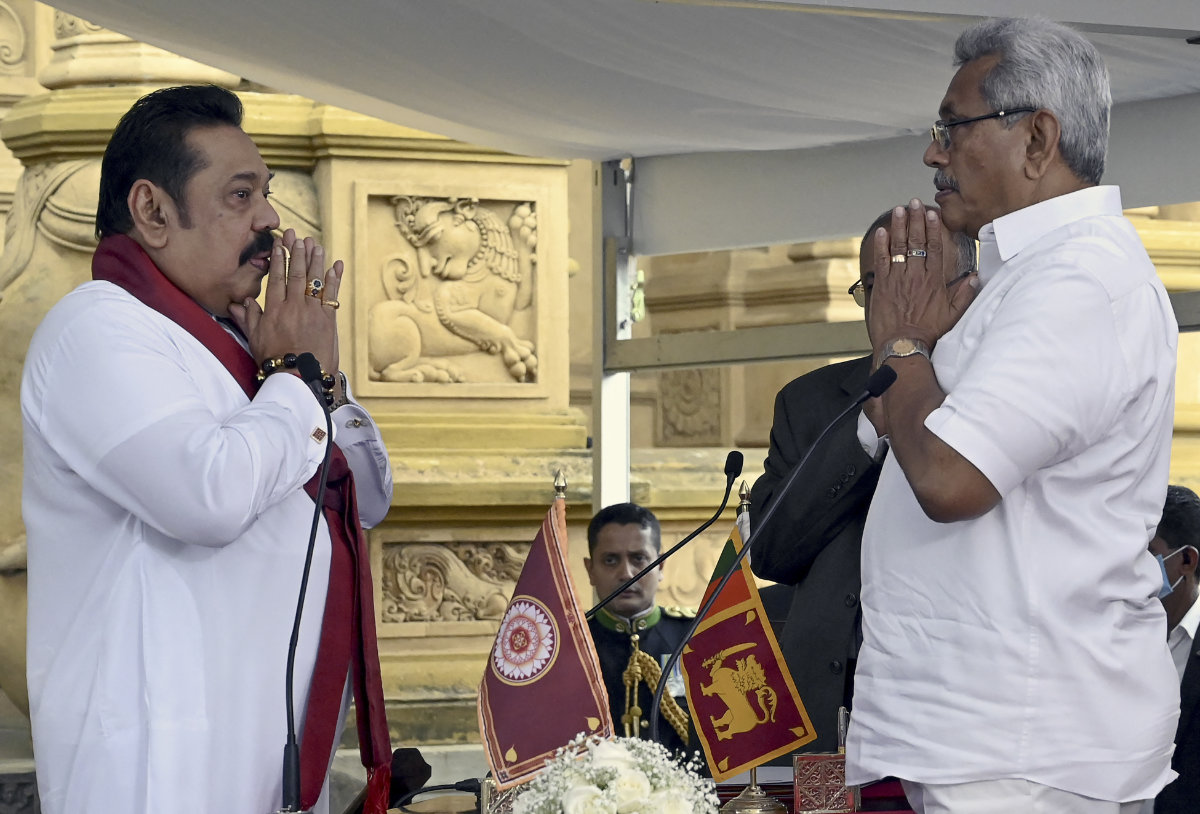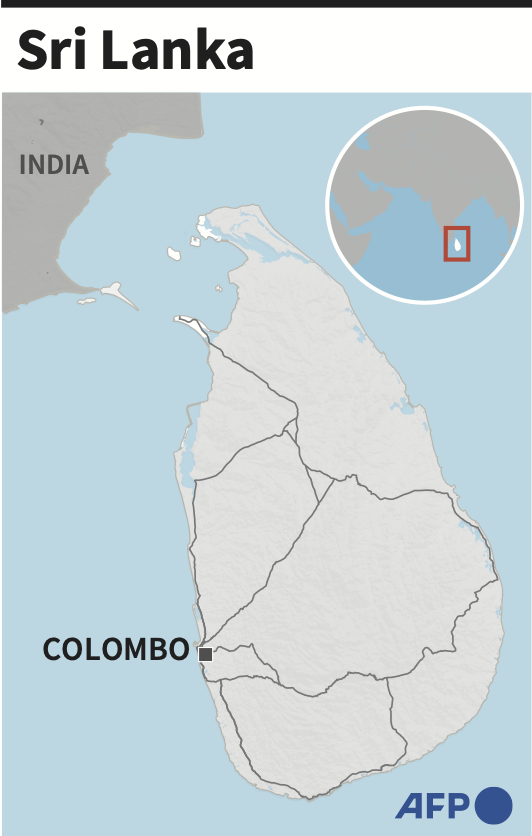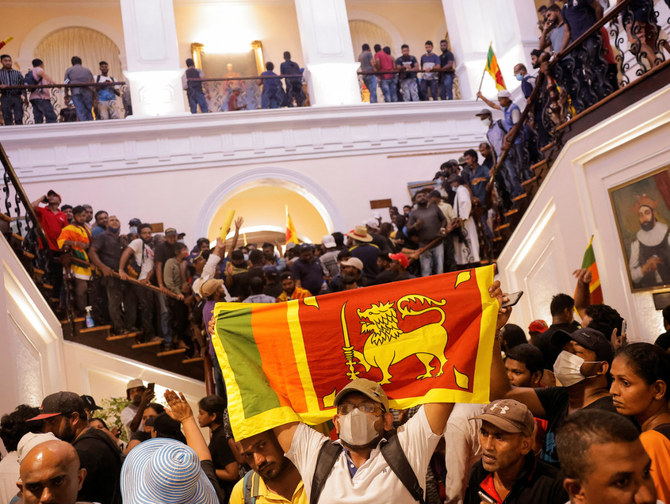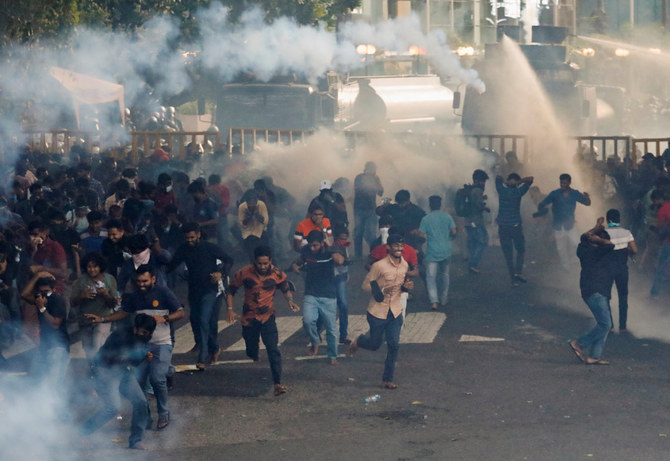COLOMBO: Sri Lanka’s President Gotabaya Rajapaksa was preparing Sunday to finally give up power after he fled from protesters who stormed his home, forcing him to announce his resignation.
The events on Saturday were the culmination of months of anti-government protests fueled by an unprecedented economic crisis that bankrupted the South Asian island nation, and fury over the ruling Rajapaksa clan’s corruption.
Hundreds of thousands of people had massed in the capital, Colombo, on Saturday to demand the government take responsibility for mismanaging the nation’s finances, and for crippling food and fuel shortages.
After storming the gates of the presidential palace, a throng of protesters walked through its rooms, with some among the boisterous crowd jumping into the compound’s pool.
Others were seen laughing and lounging in the stately bedrooms of the residence, with one pulling out what he claimed was a pair of Rajapaksa’s underwear.
After fleeing, Rajapaksa boarded a naval craft at the Colombo port and was taken to the island’s southern waters, where he said would finally bow to demands for him to step down.
“To ensure a peaceful transition, the president said he will step down on July 13,” parliamentary speaker Mahinda Abeywardana said in a televised statement.
Rajapaksa had to be extracted from his residence by troops who fired into the air to keep the crowd outside at bay.
Soon after the protesters stormed the presidential palace, Rajapaksa’s nearby seafront office also fell into the hands of protesters.

Sri Lakan President Gotabaya Rajapaksa (R) prays before he swears in his elder brother Mahinda Rajapaksa as prime minister at a Buddhist temple outside the capital Colombo on August 9, 2020. (AFP file photo)
Prime Minister Ranil Wickremesinghe, the first person in line to succeed Rajapaksa, called a meeting with political leaders and said he was willing to step down to pave the way for a unity government.
But that failed to placate protesters, who stormed the premier’s private residence and set it alight after night fell.
Footage shared on social media showed a crowd cheering the blaze, which broke out shortly after a security detachment guarding Wickremesinghe attacked several journalists outside the home.
No casualties have been reported in the fire so far, and police said Wickremesinghe and his family were away at the time.
Rajapaksa’s resignation announcement was set to trigger a power struggle.
The United States on Sunday urged Sri Lankan leaders to act quickly to seek long-term solutions.
The United States calls on “the Sri Lankan parliament to approach this juncture with a commitment to the betterment of the nation — not any one political party,” a State Department spokesperson said as Secretary of State Antony Blinken visited Thailand.
Battle zone
Security forces attempted to disperse the huge crowds that had mobbed Colombo’s administrative district earlier in the day, with dozens injured in the resulting clashes.
A spokeswoman for Colombo’s main hospital said three people were being treated for gunshot wounds, along with 36 others suffering breathing difficulties after being caught up in tear gas barrages.
Sri Lanka has suffered through months of shortages of basic goods, lengthy blackouts and galloping inflation after running out of foreign currency to import necessities.

The government has defaulted on its $51 billion external debt and is seeking an International Monetary Fund bailout.
Sri Lanka has nearly exhausted its already scarce supplies of petrol, and people unable to travel to the capital held protests in other cities across the island on Saturday.
Demonstrators had already maintained a months-long protest camp outside Rajapaksa’s office demanding his resignation.
The camp was the scene of clashes in May when a gang of Rajapaksa loyalists attacked peaceful protesters gathered there.
Nine people were killed and hundreds were wounded after the violence sparked reprisals against pro-government mobs and arson attacks on the homes of lawmakers.The unrest comes at the tail end of Australia’s ongoing cricket tour of Sri Lanka, with Pakistan’s squad also on the island for their upcoming series.
Cricket officials said there were no plans to change their schedules, adding that the sport was unaffected by the political turmoil.
“The Australian Test is coming to an end and we are due to start the Pakistan series,” a cricket board official told AFP.
“There is no opposition to having the games. In fact, fans are supportive and we have no reason to reschedule.”

















